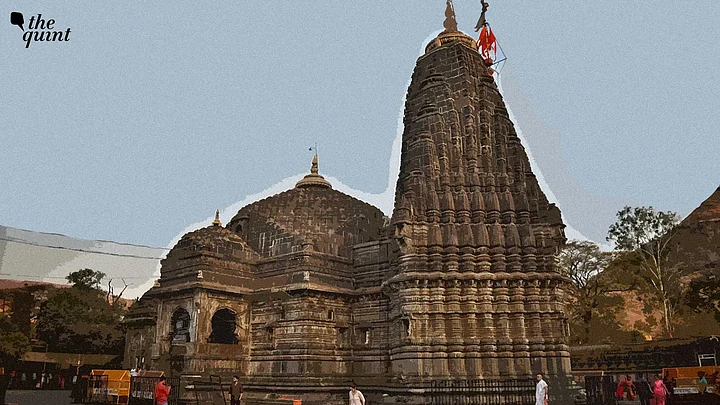"I feel if a tradition is going on for years, it should not be stopped. This issue concerns the sansthan (the temple body) and the villagers. In Maharashtra you will find many temples and mosque where you will see fraternity between Hindus and Muslims," said Maharashtra Navnirman Sena chief Raj Thackeray in a press conference on Saturday, 20 May.
What tradition was Thackeray talking about? What is the controversy surrounding Trimbakeshwar temple in Maharashtra that grabbed headlines for all of last week? Let's look at the details.
Where is the temple located? The Trimbakeshwar temple is located in the Trimbak town of the Nashik district. It is a centuries-old Shiva temple and a major pilgrimage point frequented by devotees from across Maharashtra. The Godavari river originates on the hill near the temple.
What transpired on Saturday, 13 May? A religious procession was taken out by the Muslim community in the town in the evening hours of Saturday, 13 May, in which 25-30 people participated. When the procession reached Trimbakeshwar temple, a few youngsters stopped at the north door of the temple and tried to stand on the inside steps to spread the incense (dhoop) in the general direction of the deity as per tradition. However, they were stopped by the security guards posted there, who refused to let them get on the steps.
Why did this small incident snowball into a controversy? There is a notice board at the temple's entrance that states that non-Hindus cannot enter the temple. Shri Trimbakeshwar Devasthan Trust, giving reference of the clauses in its trust constitution, took objection to the 13 May incident and filed a complaint with the local police a day later, following which a First Information Report was registered against four persons and the accused were arrested.
Further, videos of the procession were circulated on messaging platforms and social media with a sensationalised tone and rumours that the Muslims had tried to forcibly enter the temple premises and also put on a chaddar on the deity, were spread. After this, caste association like Brahmin Mahasangh and other Hindutva organisations got involved, giving a communal spin to the issue.
What is the ritual at the centre of the controversy? The Trimbak town has a small percentage of Muslim population. A group of them take out a sandal or urs procession, an annual celebration in honour of pir Gulab Shah, which culminates at the Gulab Shah dargah after a round through the town. When the procession is going through the town, it stops at the Trimbakeshwar temple to offer dhoop or loban to the deity from the outer steps. According to the locals, this small ritual has been going on for years and until this year, it always went smoothly.
SIT probe ordered: Deputy Chief Minister Devendra Fadnavis, on Tuesday, 16 May, ordered a probe by the Special Investigation Team into the incident of 13 May.
Muslims say we will stop the tradition from next year: Mateen Sayyad, one of the organisers of the procession, told reporters that if the villagers have objection to them offering incense to the deity, they will stop doing it now on.
"The procession was taken around the village. On the way back, we (symbolically) offer incense to the deity. It's out of reverence towards the deity. We have reverence towards Trimbakeshwar. One person from the procession goes ahead to offer incense. That's all. None of us tried to enter the temple. Rumours were spread about us. We only requested to let us stand so that we could offer incense. The rumour that is being spread about us, it sends wrong signal in the society. Hence, it should be stopped."– Mateen Sayyad
Hindutva organisations 'purify' the temple: On Wednesday, 17 May, members of many Hindutva organisations, such as Hindu Mahasabha, Brahman Mahasangh, Nashik Purohit Sangh, and Trimbakeshwar Purohit Sangh, reached the Trimbak town. Using rose water and gomutra (cow piss), they "purified" the temple premises and later conducted an arati. They also raised slogans such as Har Har Mahadev and Hindu Dharma Ki Jay.
(At The Quint, we question everything. Play an active role in shaping our journalism by becoming a member today.)
